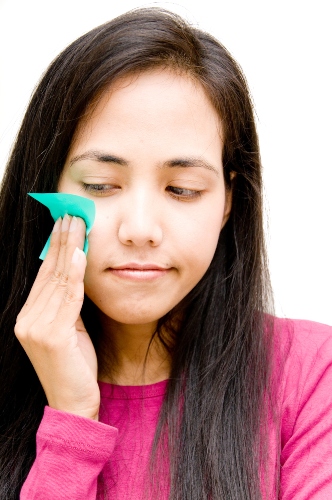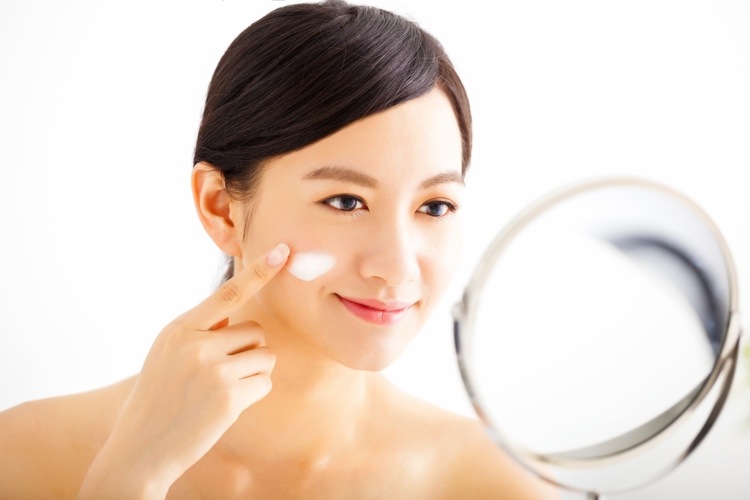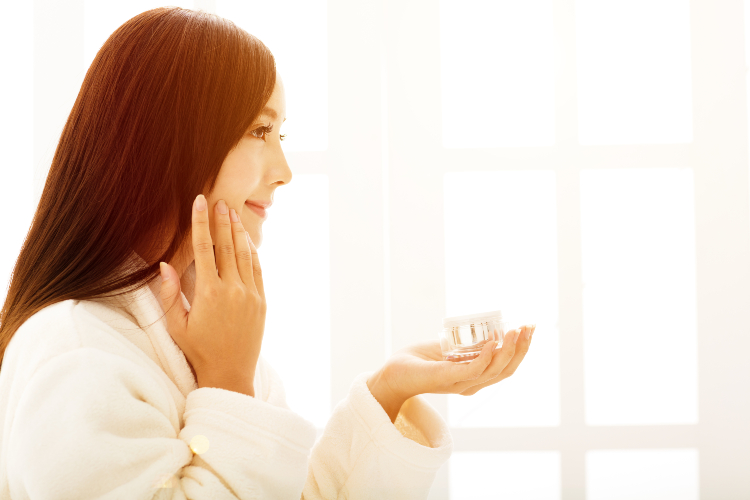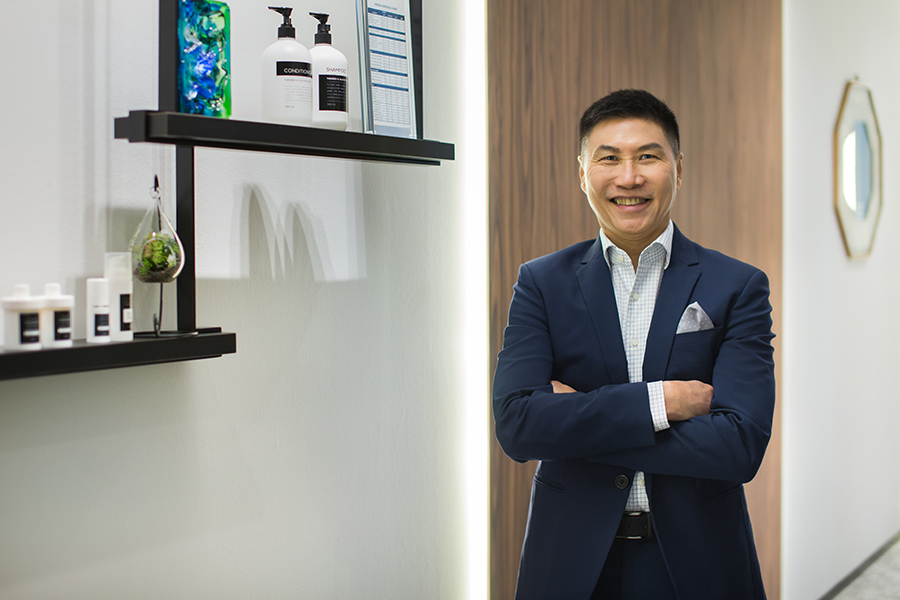What do you do when you suddenly experience a breakout, or if your skin has just been acne-prone all along? Most of the people around you would tell you that it’s to do with the skincare you’re using.
While they’re not wrong, our skin conditions are actually affected by a whole host of actions and habits that we would never have expected to be causing our acne.
We spoke to four renowned aesthetic doctors in order to find out what habits are actually bad for our skin, how much of a role they play in our skin conditions, and what changes we can make in our life to fight off those pesky pimples.
- 1. Habits can be more important than genes
- 2. You need to do this the moment you get home
- 3. Your skincare may be overly complicated
- 4. Your skin is what you eat – sort of
- 5. How you shower matters
- 6. You may be using the wrong skincare or facial treatment
- 7. Stop touching your face
- 8. What comes into non-stop contact with your face for 8 hours a day?
- 9. Choose your moisturiser well
- 10. You already know these things, and they still hold true
- The experts featured
1. Habits can be more important than genes

‘fess up, have you ever looked at someone with good skin and simply dismiss it as it being “all in the genes”? While this may be true to a certain extent, the doctors we interviewed have generally agreed that habits can play a bigger role in your skin condition than genes.
The four habits that the doctors agreed were the biggest stumbling blocks to good skin are: excessive sun exposure without adequate sun protection (that points to our favourite thing: sunblock!), smoking, poor sleep, and a stressful lifestyle.
Wear your sunscreen daily with at least one teaspoon over the entire face and extra layers on pigmented areas.
Dr YX Lum
While genes do play a part as well, bad skincare habits contribute to a larger extent. Dr Winston Lee from South Bridge Aesthetics Clinic believes that “key habits… account for up to 60% of [skin] conditions”.
Dr Georgia Lee from TLC Lifestyle Practice agrees that skin conditions can depend on “genetic predisposition”, saying that, “if [one] is more prone to acne or sensitive skin, the habits will [become] a significant contribution [to bad skin].”
2. You need to do this the moment you get home

How many of us have had someone comment that our acne flares and breakouts are caused by always putting on makeup?
Well, now you can tell them that’s not strictly true. “Makeup does not directly cause more acne,” says Dr YX Lum, although she disclaims that some makeup products do contain comodogenic ingredients that may clog pores and cause pimples.
The true culprit of acne, according to Dr Winston Lee, is actually the “improper removal of makeup“, a sentiment that is agreed upon by all the doctors we interviewed.
Remove your makeup every night thoroughly and at the earliest opportunity.
Dr Kenneth Thean
“Remove your makeup every night thoroughly and at the earliest opportunity,” recommends Dr Kenneth Thean, Medical Director of ENSOUL Medical Clinic. “Do not wait till you are about to sleep and definitely do not sleep with your makeup on.”
Dr YX Lum also advises to “double cleanse especially at the end of the day after wearing heavy makeup”.
P.S. Just because you’re not wearing makeup that day does not mean you’re let off the hook. Dr Georgia Lee reminds us to “cleanse off all … sunblock (even without makeup)” as well after getting home, since this could still clog up pores and cause acne.
3. Your skincare may be overly complicated

For those of us who may be into the Korean 10-step skincare routine, you need to read this. All four of the doctors we interviewed have expressed their beliefs that the simpler your skincare routine, the better.
Dr Georgia Lee says, “Less is more – the most important products in a person’s skincare regime are cleaners and sunblocks.”
Dr Thean echoes the sentiment by declaring himself a “firm believer” in less is more, and that this may actually help the skin become less sensitive and generally healthier over time. “By using the appropriate amounts of the correct, oil-free products, the face slowly rebalances, the skin gets less clogged, and the hypersensitivity resolves.”
Less is more.
Dr Georgia Lee

He explains, “One of the most overlooked skincare mistakes I encounter is the rather common practice of applying too many different products to the face. […] I often have to treat patients with bad skin because they put on too much skin care products, which are basically chemicals, on their skin.”
Dr Winston Lee agrees, advising that “excessive complicated skincare regimens [should] be avoided.”
4. Your skin is what you eat – sort of

While there is no scientific evidence to show that fried stuff and other unhealthy foods are a direct cause of acne and pimples, it certainly isn’t great for your body if you eat them too much and too often, which would also affect your skin.
“Everything in moderation,” says Dr YX Lum. “Eat less processed foods and load up on antioxidants and vitamins.”
Dr Georgia Lee agrees, advising those who are acne-prone to stay away from a “high GI diet”, such as spicy food, caffeinated drinks, and anything that may cause your stomach to produce more acid. Dairy is also something that should be avoided as they have a “temporal association with a flare-up”.
Everything in moderation.
Dr YX Lum
Whether you get them from natural sources or you choose to buy supplements, Dr Winston Lee advises loading up on zinc and Vitamins C and D. Dr Thean explains further that zinc is needed for skin healing, while Vitamin C is essential for collagen synthesis, to keep your skin more supple and plumper.

Ensure that you are giving your body enough protein to work with! “[Your] skin is 70% collagen and elastin. Enough protein must be consumed to ensure the skin has enough amino acids to make collagen, which keeps the skin firm, toned, supple and strong,” says Dr Thean.
Needless to say, all the doctors unanimously emphasized the point that adequate hydration is absolutely vital for skin, so you need to be getting your 8 glasses of water a day.
5. How you shower matters
How many of us opt to wash our faces before we hop in to the shower for our regular bath time? Dr Thean advises against this, and instead recommends washing your face after you’ve shampooed and conditioned your hair.
“Hair products like shampoo, conditioner, sprays and gels contain chemical agents like silicones and sulfates that can trigger acne. Try not to let these hair products come in contact with your face. After using these products, clean your face and neck so that no residue remains.”

Furthermore, these hair products typically contain a ton of fragrances, which could irritate skin or cause skin reactions when it comes into contact with your face – you can imagine that that isn’t too great for acne-prone skin. Dr Thean encourages the use of fragrance-free shampoo and conditioners instead.
6. You may be using the wrong skincare or facial treatment

Some of us may feel that in order to get rid of serious breakouts, you need to treat fire with fire and go ham on those pimples with aggressive skincare treatments. The doctors, however, frowned upon this mindset.
What counts as an aggressive skincare treatment? Both Dr Georgia Lee and Dr Thean agreed that chemical exfoliators such as alpha hydroxy acids (AHA), beta hydroxy acids (BHA), and salicylic acids are too strong for those with acne-prone skin, even if the product is supposed to target zits.
The cells may not have sufficient time to heal.
Dr Georgia Lee
Dr Thean also advises to avoid physical exfoliators, such as those made of “ground-up nuts, sugars or sand” because these contain “sharp edges that can cause micro-tears to the skin and can further damage it.”

Instead, Dr Thean is in favour of using “mild cleansers” and avoiding the foaming types, especially those that contain PEG (polyethylene glycol) surfactants. These chemicals can “cause dryness and unbalance the skin’s barrier function by stripping skin of its natural oils.”
Needless to say, everyone should be avoiding alcohol-based skincare and makeup. “Products with a high percentage of isopropyl alcohol can dehydrate and harm the skin’s barrier function,” says Dr Thean.
Dr Georgia Lee also advises those with acne-prone skin to avoid “abrasive treatment procedures like chemical peels and microdermabrasions”.
7. Stop touching your face

It’s not something particularly new, but it’s a habit that a lot of us have trouble breaking or avoiding.
“Our fingers come into contact with bacteria that are transferred to the face by repeated touching. This can trigger breakouts and make pimples worse,” says Dr Thean.
8. What comes into non-stop contact with your face for 8 hours a day?

It may sound like common sense, but changing one’s pillowcases and bedsheets is an aspect of life frequently overlooked when dealing with skin problems.
“Dirty pillowcases and bed sheets can cause dirt to settle on your face and cause acne breakouts,” explains Dr Thean. “Acne sufferers should change their bedding more often.”
No more excuses for laziness if you want clear and bright skin!
9. Choose your moisturiser well

Don’t get us wrong, moisturising is great and it is probably one of the most essential parts of skincare. In fact, aside from hydrating your skin, moisturisers can actually protect it from environmental damage as well.
“Moisturising the skin helps to build a barrier between the skin and the environment,” says Dr YX Lum. “That can help to shield the skin from the polluted environment.”
However, not any moisturiser is going to be great for your skin. To solve your acne problem, you need to be using the right kind of moisturiser to make your skin better, not worse.

“Try to buy oil-free products,” says Dr Thean. “Use light and oil-free moisturisers and sunscreen.”
If your skin isn’t able to handle cream and gel moisturisers, Dr Winston Lee recommends going for hydration serums instead, rather than simply going without moisturiser. “A light serum I would recommend [is] Skinceutical Vitamin B5 serum.”
10. You already know these things, and they still hold true
These tenets of skincare are commonly bandied about, and for good reason. You can’t run away from confronting these issues if you’re really serious about improving your skin condition.
Managing stress levels

It’s impossible to have a completely stress-free life nowadays, but managing your stress levels will play a huge role in helping your skin. “Stress causes increases stress hormone cortisol release and that can cause clogged pores,” says Dr YX Lum.
Dr Thean recommends managing stress with ways such as “mindfulness meditation and exercise”.
Adequate sleep

Yes, we know how difficult it is to maintain a regular sleep schedule when you’re a working adult, and it’s even worse if you’ve just started a family.
However, the biological facts can’t be avoided – all four doctors unanimously agreed that poor sleep habits will play a huge role in worsening acne.
Stop smoking

This is yet another one of those things that is easier said than done, but once again, we can’t run away from the facts.
“Smoking is very bad for the skin. There is a decrease in oxygen supply to the face and increased damaging free radical production,” Dr Thean explains. “There is more breakdown of collagen and elastin, leading to wrinkles and open pores. The smoke also irritates the skin. All these will cause your skin to produce more oil and more pimples.”
Exercise regularly

It’s like the world is a broken record and keeps telling you the same health advice over and over again – but we believe that this is for a good reason.
“Exercising helps the skin in more ways than one. It keeps the skin healthy and radiant, […] by increasing the blood flow and improving the lymphatic system, carrying oxygen and important nutrients to vital organs including our skin,” says Dr YX Lum.
“It also helps to carry away the waste products from the cell. This way, it helps to nourish the skin and flush away the toxins giving the skin a healthy, rosy colour. In addition, exercising also helps to reduce the stress levels that one experiences.”
If you aren’t already exercising regularly, we get that it’s tough to start. Take things slow and easy first, push yourself at a very comfortable pace, and remember that you’re doing this to improve your health and quality of life, not to prove anything to anyone.
The experts featured
Dr Georgia Lee

Armed with extensive experience and credentials in dermatology and aesthetic medicine, Dr Georgia Lee started her own practice in 1999 and has since earned a reputation for being a top celebrity aesthetic doctor.
She now practises at TLC Lifestyle Practice, and has also launched her own cosmeceutical skincare brand, DrGL. Dr Lee also runs a combined spa experience, DrSkin and DrHair, located at Tangs Beauty Services on Level 4, which provides facial treatments and hair loss solutions entirely with DrGL products, or methods approved by Dr Lee herself.
TLC Lifestyle Practice
Address: 9 Scotts Road, #11-04/05, Pacific Plaza, Singapore 228210
Telephone: +65-6462-0083
Opening hours: Mon & Sat 8am to 4.30pm, Tue to Fri 8am to 8.30pm, closed on Sun and PH
Website: TLC Lifestyle Practice
For appointments: [email protected]
Dr Winston Lee

Source: Metropolitant
Graduating from the National University of Singapore in 2005, Dr Winston Lee now heads the team of aesthetic doctors that drive South Bridge Aesthetics Clinic. He practices aesthetic medicine with 2 key tenets: “Less is more” and “Beauty encompasses within and without”.
His practice mainly focuses on non-invasive face lifting, weight control, and body contouring. Besides these, Dr Lee also actively practices Emergency Medicine and Men’s Health, and sees patients in the Emergency department of Tan Tock Seng Hospital during his non-clinic hours.
South Bridge Aesthetics Clinic
Address: 277 South Bridge Road, Singapore 058826
Telephone: +65-9730-8999
Opening hours: Mon to Fri 10am to 8pm, Sat & Sun 10am to 3pm. Other times by appointment.
Website: South Bridge Aesthetics Clinic
For appointments: [email protected] or contact form here
Dr YX Lum

Having graduated from Trinity College in Dublin with a Bachelor of Medicine and Bachelor of Surgery degree, Dr YX Lum went on to earn various graduate diplomas and certification for aesthetic medicine. Having once battled with acne and breakouts herself, Dr Lum has since had a strong interest in acne treatment, and innovating products and treatments for the condition.
Dr Lum is currently part of the team of doctors running IDS Clinic, specialising in skincare solutions from Botox® fillers, laser treatment, to simply acne prevention.
IDS Clinic
Address: 8 Sinaran Drive, #05-07 to 10, Novena Specialist Center, Singapore 307470
Telephone: +65-6568-3555
Opening hours: Mon – Fri 10am to 8pm, Sat 10am to 5pm, closed on Sun and PH
Website: IDS Clinic
For appointments: Through the form on their website
Dr Kenneth Thean

Dr Kenneth Thean is the Medical Director of ENSOUL Medical Clinic, and has been a practising medical doctor for almost 37 years now. He has post graduate fellowships from the Royal College of Surgeons of Edinburgh and the Royal College of Surgeons and Physicians of Glasgow, and was a former administrator of the National Skin Center.
His passion for aesthetic medicine has led him to gain knowledge from experienced counterparts in Korea, USA, South America, Malaysia, Thailand, Australia, and Singapore. He regularly conducts regional training sessions for other aesthetic doctors, and was previously the Global Chief Medical Officer for a regional chain of aesthetic clinics.
ENSOUL Medical Clinic
Address: 360 Orchard Road, #08-01 International Building, Singapore 238869
Telephone: +65-6836-2833 / +65-8798-2892
Opening hours: Mon – Fri 10am to 8pm, Sat 10am to 5pm, closed on Sun and PH
Website: ENSOUL Medical Clinic
For appointments: [email protected] or by contact form here


